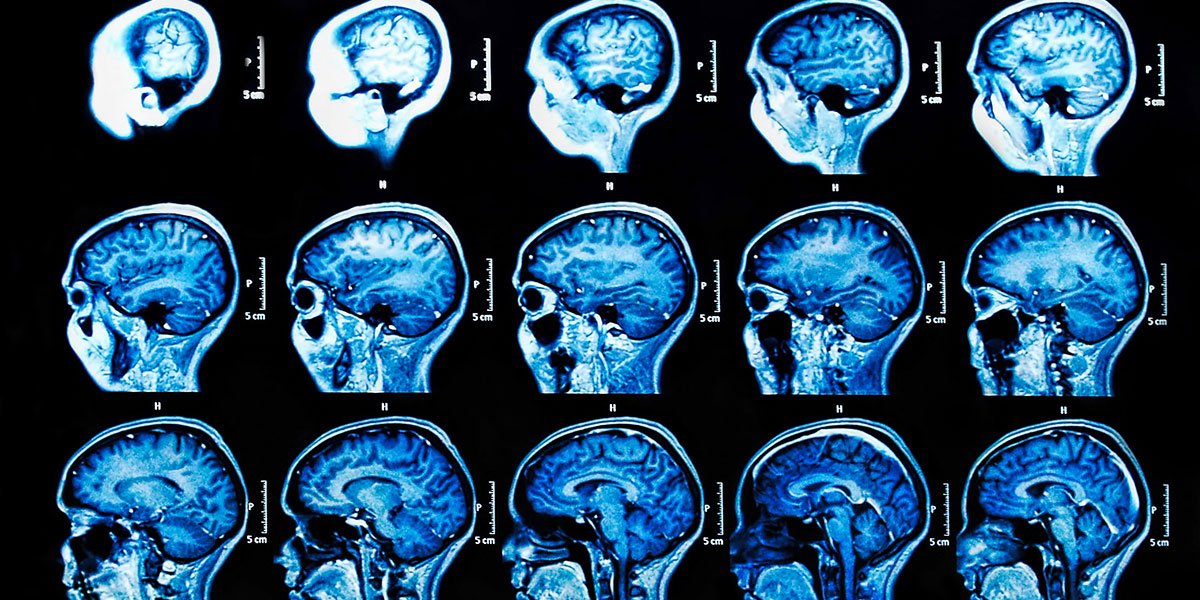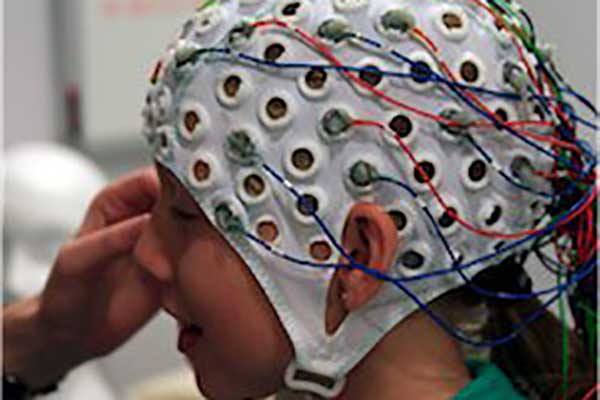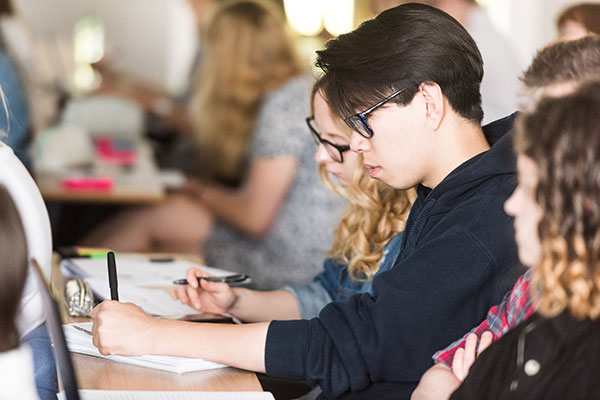
MSc Developmental Cognitive Neuroscience
Explore the relationship between the development of the mind and the brain
Year of entry: 2026 (September)
Developmental cognitive neuroscience explores how the mind changes as children grow up, examining the environmental and biological influences on the developing brain.
You'll be provided with perspectives from developmental cognitive neuroscience and developmental and cognitive psychology, and receive hands-on training in brain imaging methods.
You'll explore topical issues such as the neural bases of perceiving, acting in the physical and social world, the development of emotion regulation and pro-social behaviour, and neuroeducation.
Course content
This course is made up of 180 credits, consisting of taught modules and a substantial independent research project.
Your empirical research project enables you to participate in the design and implementation of a theoretically-motivated piece of pure or applied research in cognitive neuroscience, providing hands-on training in advanced brain imaging methods, some of which are being developed at York.
Modules
Core modules
- Principles of Cognitive Neuroscience
- Data Analysis in Neuroimaging
- Neurodevelopmental Conditions
- Research Design and Statistics
Option modules
You will study one option module. Examples can be found below. Some option module combinations may not be possible. The options available to you will be confirmed after you begin your course.
- Assessment and Interventions for Developmental Disorders
- Child and Adolescent Mental Health
- Introduction to Programming
- Social Cognitive Development
- Transition to Parenthood
- Perception of Actions and Human Behaviour
- Face Perception
Our modules may change to reflect the latest academic thinking and expertise of our staff, and in line with Department/School academic planning.
Dissertation
As part of this MSc you will be given the opportunity to undertake a novel piece of empirical work on a topic at the cutting edge of research in developmental psychology and/or cognitive neuroscience. You will be supervised by faculty members who have relevant expertise in fields such as:
- language and literacy development
- numerical cognition
- social and emotional development
- perception
- learning and memory.
The Empirical Project aims to enhance your understanding of statistical and analytic techniques, and the ethical issues involved in carrying out research around developmental cognitive neuroscience.
Learning outcomes
Every course at York is built on a distinctive set of learning outcomes. These will give you a clear understanding of what you will be able to accomplish at the end of the course and help you explain what you can offer employers. Our academics identify the knowledge, skills, and experiences you'll need upon graduation and then design the course to get you there.
Learning outcomes for this course
- Knowledge: Demonstrate a deep and systematic understanding of how cognitive processes and behaviour develop from infancy to adulthood, how this development can be explained in terms of their underlying brain processes and how modern neuroimaging techniques can be used to understand the properties of the developing human mind.
- Critical evaluation: Critically evaluate theories within and beyond the field of developmental cognitive neuroscience, using empirical evidence to support their reasoning and arguments.
- Analysis of Data: Demonstrate a systematic knowledge of a range of advanced research paradigms, research methods in cognitive neuroscience and advanced statistical analysis and how these methods can be used to explain mental processes and behaviour with a focus on measuring developmental outcomes.
- Research Skills: Identify and evaluate relevant scientific evidence from the range of methodologies used in developmental cognitive neuroscience and thus solve complex problems using evidence-based and scientific reasoning to identify and pose new research questions, to devise new methods to address them and to consider alternative approaches to their solutions and evaluate these.
- Solve Complex Problems: Design, conduct and interpret systematic, scientifically rigorous and ethically sound studies, using a combination of advanced quantitative methods and statistics, supported by state-of-the-art software, in the context of methodologies used in cognitive neuroscience and developmental psychology.
- Communication: Communicate complex concepts effectively using discipline-specific written, oral and graphical means, adapting the content and presentation style to make it appropriate to specific audiences and settings: academic research outlets, parents, teachers and other professionals.
- Management Skills: Demonstrate that they are able to work autonomously in planning and implementing tasks at a professional level, making decisions based upon complex and uncertain information, take responsibility for their own learning and professional development, and work effectively as a member of a team.
Fees and funding
Annual tuition fees for 2026/27
| Study mode | UK (home) | International and EU |
|---|---|---|
| Full-time (1 year) | £13,900 | £32,900 |
Fees information
UK (home) or international fees? The level of fee that you will be asked to pay depends on whether you're classed as a UK (home) or international student. Check your fee status.
Find out more information about tuition fees and how to pay them.
Additional costs
Most of your reading will be available from the University Library and Virtual Learning Environment (VLE), however you may need to purchase some textbooks.
Funding information
Discover your funding options to help with tuition fees and living costs.
We'll confirm more funding opportunities for students joining us in 2026/27 throughout the year.
If you've successfully completed an undergraduate degree at York you could be eligible for a 10% Masters fee discount.
Funding opportunities
Chevening Scholarships
We are pleased to work with Chevening Scholars to offer funding for our Masters programmes. Chevening Scholarships provide one year of fully-funded postgraduate study in the UK for international (including EU) students. The scholarships are open to early and mid-career professionals who have the potential to become future leaders.
Teaching and assessment
You’ll work with world‐leading academics who’ll challenge you to think independently and excel in all that you do. Our approach to teaching will provide you with the knowledge, opportunities, and support you need to grow and succeed in a global workplace.
Teaching format
You'll be taught through lectures, seminars, practicals and group work by academic experts within the Department of Psychology as well as external experts from other academic institutions. As the course progresses, you'll have greater independence with the emphasis being on choice, specialisation, and independent study, all supported by supervisors.
Seminars focus on small group work, discussions and presentations. You will gain knowledge in all aspects of research, from designing and carrying out experiments to analysing, critically evaluating and interpreting results. This experience will equip you with valuable skills that you will apply in your final empirical project.
Through the Virtual Learning Environment, you will have access to teaching materials, including lecture slides and recordings, practical demonstrations and supporting materials.
Facilities
Our Department is purpose-built with superb teaching and research facilities.
You'll have access to our multimodal Action Perception Laboratory, a Numerical Cognition Lab, an EEG Lab, TMS Lab, Sleep Lab, the York Developmental Social Neuroscience Lab and the York Neuroimaging Centre which is equipped with two MRI scanners and a MEG scanner.
Teaching location
The Department of Psychology is located on Campus West.
Most tutorials, seminars, practical work, staff offices and laboratories are in our purpose-built psychology building.
About our campus
Our beautiful green campus offers a student-friendly setting in which to live and study, within easy reach of the action in the city centre. It's easy to get around campus - everything is within walking or pedalling distance, or you can always use the fast and frequent bus service.
Assessment and feedback
Modules are assessed through essays, critical analysis, presentations, practical reports, and a dissertation and poster presentation based on the Empirical Project.
Careers and skills
This MSc will enhance your transferable skills as well as the skills required for careers in a range of industries. For example, you’ll learn a variety of research and clinical methods that can be applied to childhood development and its disorders; as well as carrying out extensive independent research. Many of our graduates go on to complete PhDs, typically in psychology. Others go on to pursue careers in clinical psychology, educational psychology, or find work as children’s wellbeing practitioners, assistant psychologists and research assistants.
The Department's Employability Coordinator works closely with the University Careers Service, which offers our students an additional range of career and recruitment events, skills sessions and one-to-one advice.
This MSc does not confer Graduate Basis for Membership of the British Psychological Society (BPS). Graduate Basis for Membership is required for entry to doctoral training in clinical and educational psychology in the UK, as well as some professional psychological careers. You may already hold Graduate Basis for Membership (for example, from a BPS-accredited undergraduate degree), in which case this MSc could enhance your applications to jobs or doctoral courses that require it. If you don't have Graduate Basis for Membership then you may be interested in our MSc Psychology in Education conversion course.
See the BPS website for more information about professional pathways in psychology (bps.org.uk).
Career opportunities
- Cognitive trainer
- Rehabilitation support worker
- Forensic Psychologist
- Educational Psychologist
- PhD student and researcher
- Social worker
Transferable skills
- Critical thinking
- Critical evaluation
- Time management
- Reasoning
- Analysis
- Problem-solving
- Pragmatism
- Teamwork
Entry requirements
| Qualification | Typical offer |
|---|---|
| Undergraduate degree | 2:2 or equivalent in Psychology, Neuroscience, Biology or a relevant discipline. We will be looking for evidence of strong marks in relevant modules including: biological psychology, neuroanatomy, developmental psychology, neuroscience related modules, and research methods and statistics. |
| Other international qualifications | Equivalent qualifications from your country |
English language
If English isn't your first language you may need to provide evidence of your English language ability. We accept the following qualifications:
| Qualification | Minimum requirement |
|---|---|
| IELTS (Academic and Indicator) | 6.5, minimum 6.0 in each component |
| Cambridge CEFR | B2 First: 176, with 169 in each component |
| Oxford ELLT | 7, minimum of 6 in each component |
| Oxford Test of English Advanced | 136, minimum 126 in each component |
| Duolingo | 120, minimum 105 in all other components |
| LanguageCert SELT | B2 with 33/50 in each component |
| LanguageCert Academic | 70 with a minimum of 65 in each component |
| Kaplan Test of English Language | 478-509, with 444-477 in all other components |
| Skills for English | B2: Merit overall, with Pass with Merit in each component |
| PTE Academic | 61, minimum 55 in each component |
| TOEFL | 87, minimum 21 in each component |
| Trinity ISE III | Merit in all requirements |
For more information see our postgraduate English language requirements.
If you haven't met our English language requirements
You may be eligible for one of our pre-sessional English language courses. These courses will provide you with the level of English needed to meet the conditions of your offer.
The length of course you need to take depends on your current English language test scores and how much you need to improve to reach our English language requirements.
After you've accepted your offer to study at York, we'll confirm which pre-sessional course you should apply to via You@York.
Next steps
Discover York








